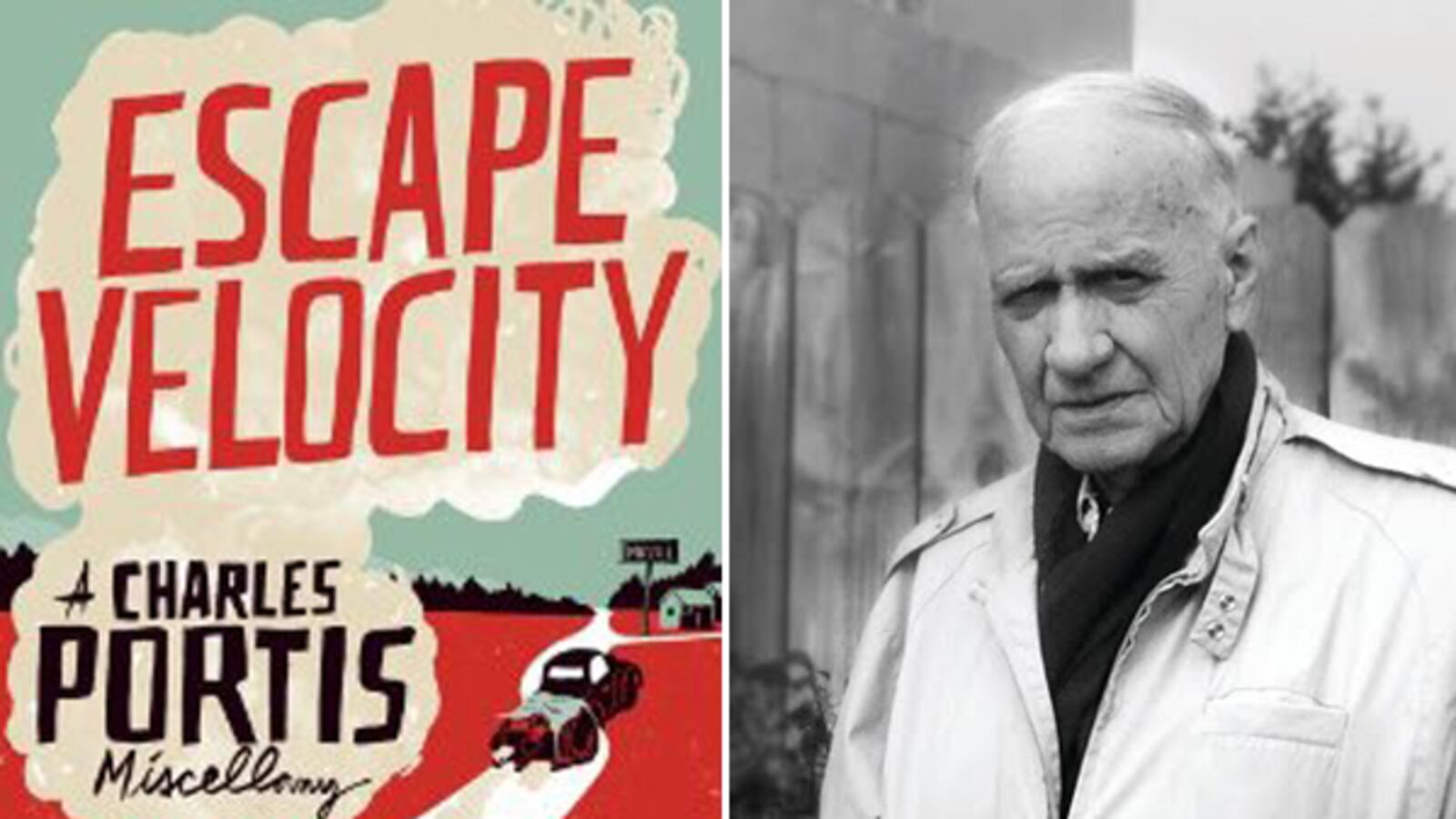In his fiction and magazine pieces over more than a half-century, the novelist Charles Portis, most celebrated for True Grit and much admired by fellow writers like Roy Blount Jr., Donna Tartt, and Wells Tower, has made relentless fun of journalists of all stripes. Ray Midge, the copy editor who tracks his errant wife to Mexico in The Dog of the South, comments about the fellow copy editor who stole her away: “His dress was sloppy even by newspaper standards.” In Masters of Atlantis, newspaper people “treat as pests those who walk in off the street with inquiries, or even news.” In a New Yorker humor piece, he describes the “journalist ants” of Burma, “scurrying about on the forest floor and gathering tiny facts.” And in a long travel story about a river in Arkansas—included in the upcoming collection of his work I edited, Escape Velocity: A Charles Portis Miscellany—he offers an opinion on both the climate debate and himself as a journalist: “Knowing nothing about changing weather patterns, but, being a journalist and thus having no scruples about commenting on the matter, I think they may well have changed.”
These various put-downs, especially of himself, are a dodge, because although Portis the novelist is press-shy and publicity-averse, in his early career he was a skilled, diligent, and sometimes brilliant journalist, which the selection of his best newspaper work in Escape Velocity will demonstrate. After serving in the Marine Corps during the Korean War, he studied journalism at the University of Arkansas. (Looking back at those years in an interview with fellow newspaperman Roy Reed, he said, “I must have thought it would be fun and not very hard, something like barber college. Not to offend the barbers. They probably provide a more useful service.”)
After graduating, he worked briefly at The Commercial Appeal in Memphis, moved to the Arkansas Gazette in 1959 (a year after the paper had won two Pulitzer Prizes for covering the integration crisis at Little Rock Central High), and then began a four-year stint (1960-64) with The New York Herald Tribune, ending as London bureau chief before he quit to write novels. At the latter, he shared a newsroom with Tom Wolfe, Jimmy Breslin, and other reporters who were stretching their craft into what came to be known as New Journalism. In fact, in a 1972 piece in New York magazine excavating that “movement,” Wolfe cites Portis as one of the preeminent feature writers in the city who followed the philosophy that “it just might be possible to write journalism that would ... read like a novel.” Wolfe’s own flamboyant style bears little resemblance to Portis’s straightforward one, but in their reporting both showed—and eventually brought back to their respective novels—expertise in conveying “scene” and an eye for the telling detail. These qualities and other examples of Portis’s extraordinary abilities as a journalist are best seen in his brief, overlooked tenure on the civil-rights beat, particularly during a busy spring and summer in the South in 1963.
The failure of historians studying the era to acknowledge Portis’s work that year is a mystery to me. His name is absent from David J. Garrow’s Bearing the Cross (1986); Taylor Branch’s Parting the Waters (1988) and Pillar of Fire (1998); Diane McWhorter’s comprehensive history of Birmingham’s troubles, Carry Me Home (2001); and perhaps most egregiously, The Race Beat: The Press, the Civil Rights Struggle, and the Awakening of a Nation (2006), which won the Pulitzer Prize for history. Neither is he included in the two volumes of the Library of America’s collections Reporting Civil Rights (2003), though one of his Herald Tribune colleagues, Robert J. Donovan, is.
At the time, however, his journalism was recognized for its excellence, and his account of two bombings in Birmingham that threatened to derail a desegregation agreement was reprinted in a collection published the next year, Twentieth Century Reporting at Its Best (1964), which praised it as a “crisp, tightly-written story.” More impressive still is the deadline duress under which it—and an accompanying story about a Ku Klux Klan meeting—was produced.

On the evening of Saturday, May 11, 1963, Portis went to nearby Bessemer to cover a Klan rally. The animosity toward the press in Birmingham—and especially the New York and national press from the local authorities, including the police—was significant. Earlier that month, a Life reporter and his photographer, who had captured with his camera demonstrators being pummeled by fire hoses, were arrested and had to flee the state after making bail, certain they could not get a fair trial.
Portis was aware of himself as a target for locals who despised the media. In a story filed earlier that day, he had written of a Friday night gathering in the county courthouse in which “angry white extremists” who opposed the integration of downtown stores “ejected” the newsmen. Portis added, with wry pride, “A reporter from the Herald Tribune, in particular, was booed.” It must have taken no small amount of courage to then present himself in Bessemer the following night. Fortunately for him, the Klan crowd there “was not rising to the rhetoric,” as McWhorter writes, and when it ended about 10:15 p.m., Portis headed back to the Tutwiler Hotel with some other reporters. Around midnight, he and the others heard the “dull whoomp” of an explosion and they rushed to the scene, the Gaston Motel four blocks away.
What followed was a full night of rioting, arson, and civil unrest, unquelled until 6 a.m., by which time more than a thousand policemen and state troopers had brutally subdued African-American participants and spectators both. Portis had been in some peril from the fire and from bricks and bottles thrown. The city’s reckless armored police vehicle, he writes as he dips briefly into the first-person plural, “mounted the sidewalk once and made a headlong pass down it, sending about 50 of us spectators diving for the dirt.”
The next day, no doubt on very little if any sleep, he produced a 1,900-word front-page story about the evening’s chaos, one that not only captures the scene with immediacy and concreteness but gives it context and lyricism. When he describes the attack of a Col. Lingo on defenseless black bystanders, he takes the time to remind us that “Col. Lingo and his men had been chafing all week at the moderation and restraint of Chief Moore and his city police.” When he notes that at dawn a police car announced that residents should “get off the God damn streets, get,” he adds with subdued irony, “but someone put a stop to that, evidently because it was Sunday and Mother’s Day.”
Included with the long piece was Portis’s sidebar about the Klan rally. Readers will recognize in it more clearly Portis the novelist, casting a gimlet eye on any organization or person that leans toward groupthink and messianism, much less notions of superiority underpinned by violence (see his novel Gringos). His report portrays the meeting and its participants as tedious and shabby rather than menacing, reserving the unkindest cut for the visiting grand dragon of Mississippi in what is my favorite line of the collection: “Everyone drifted away and the grand dragon of Mississippi disappeared grandly into the Southern night, his car engine hitting on about three cylinders.” For Portis, as his fans well know, any man who can’t even keep his car tuned is a man to be scorned indeed. An empathetic, unsentimental Southerner, Portis in this vein points himself in the same direction as his predecessors in fiction like William Faulkner, Eudora Welty, and Flannery O’Connor, writers who understood deeply the milieu and did not blink in facing its contradictions.
To my mind, Portis’s complete coverage of that marathon evening is one of the great deadline reporting efforts of the civil-rights era and maybe of the second half of the 20th century. Why has it, along with his other work of that time, gone unrecognized?
For one thing, his coverage of civil rights was largely limited to that year; by November 1963, he had moved to the London bureau. Others on the beat, like Claude Sitton of The New York Times and the Herald Tribune’s own Donovan, who primarily covered the politics of the movement from Washington, D.C., rather than front lines, made the subject their life’s work, while Portis left it behind to write novels.
Another reason might have been the dubiousness with which the tactics of the so-called New Journalism were viewed. The Herald Tribune was known as a writers’ newspaper and its marketing slogan at the time was “Who Says a Good Newspaper Has to Be Dull?” The answer for a few critics was, We do. Walker Gibson, in his book Tough, Sweet & Stuffy: An Essay on American Prose Styles (1966), pointed to a Portis story about an earlier day’s action in Alabama and with horror accused the journalist of employing “the model of the novelist” (italics in the original). Gibson favors Sitton’s concurrent New York Times piece, though even he admits it may be “a little dull, considering the circumstances.”
Further, and perhaps ultimately more important, was the imminent demise of the Herald Tribune, which expired for good after frequent starts, stops, and strikes in 1967. That abrupt ending left the work of Portis for the paper—not to mention that of illustrious alumni in addition to Wolfe and Breslin, like Dorothy Thompson, Dick Schaap, Red Smith, Lewis Lapham, Virgil Thomson, and Art Buchwald—as an orphan of the eventual Internet age, consigned to microfilm, undigitized; and even so, the microfilm is scarce. Some Internet billionaire would do literature, history, and journalism a great service by funding a project to convert the Herald Tribune’s microfilm to a searchable digital archive.
Finally and most obviously, a significant reason for the obscurity of Portis’s journalism is the same one that caused his novels (other than True Grit) to go out of print for a time: what some have called his reclusiveness, perhaps more accurately described as his desire to do the work of fiction rather than talk about it or promote it. Since leaving the Herald Tribune and returning to Arkansas in 1964, he has toiled away at an oeuvre that led Ron Rosenbaum to call him “the most original, indescribable sui generis talent overlooked by literary culture in America.” Novelist Ed Park, in a long essay in The Believer in 2003, asserted that Portis has written “five remarkable, deeply entertaining novels (three of them surely masterpieces, though which three is up for debate).” Portis politely declines most interview requests, but when he has spoken to me of his time as a journalist, he modestly underplays his efforts (while stressing how well he was treated by his employers and fondly recalling talented colleagues). Perhaps for him, the practice of the newspaperman, despite his skill at it, was too much like that of the journalist ants, which “coat ... facts with a kind of nacreous glaze.” In the art of the novel, he better found his own imaginative, uncoated truth.






